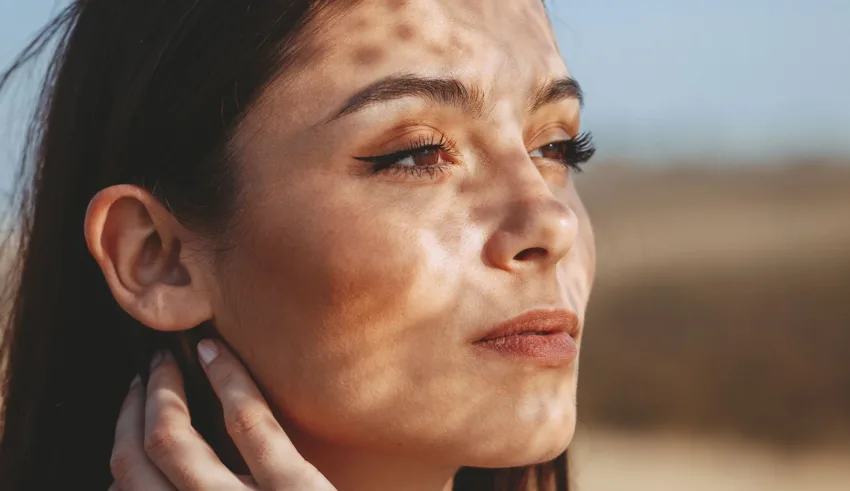
Have you ever suffered from acne and liked to get a bit of a tan, as the pimples seem to dry up and the marks blend into normal skin? If you suffer from acne and love sunbathing, it’s because you think it provides this immediate “quick fix”. But have you noticed that a few weeks later, you always end up with an even worse acne flare-up! Read this article, written in collaboration with the dermatologist Dr. Zeina Knio, to find out more. We’re here to take you behind the curtain, in search of the truth!
What is the illusion of tanned, acne-free skin?
Many people believe that sunlight makes acne disappear, and that tanned skin is generally blemish-free. In reality, the skin is tanned and darkened around imperfections, making them less visible to the naked eye. It’s all an illusion, my friends!
According to Dr. Zeina Knio, acne is a complex skin condition involving increased sebum production, increased inflammation, impaired skin renewal, and colonization by P. acnes bacteria. Although acne seems to improve temporarily with sun exposure, excessive exposure can worsen it, making marks darker, skin more sensitive, delaying healing and even triggering flare-ups!
She adds that a recent study has shown that UV radiation, at the microscopic level, actually induces pro-inflammatory and pro-fibrotic responses, which can translate clinically into triggering flare-ups!
Does sunscreen cause acne?
“The common misconception among acne patients is that wearing sunscreen causes breakouts, and I see many who avoid wearing it,” notes Dr. Zeina Knio. She clarifies that a daily sunscreen, as long as it’s adapted to your skin, won’t clog your pores but will enable your skin to respond better to treatments, minimize skin irritation, heal better, and have much less pigmentation and scarring.
Dr. Zeina Knio explains that acne patients suffer from increased sebum production, so they should always choose a sunscreen labeled “non-comedogenic” and “oil-free”. Sunscreens containing seed oils can significantly clog pores and cause more blackheads and pimples. So opt for a light texture rather than a thick cream.
There are actually two types of sunscreen: mineral and chemical.
1- Mineral sunscreens
Dr. Zeina Knio states that mineral sunscreens can be a safer option for people with both acne and sensitive skin. Mineral sunscreens use zinc oxide and titanium dioxide to create a thin barrier layer that physically blocks or reflects UV rays. Zinc oxide not only controls sebum production but also has anti-inflammatory effects. Choose the latest mineral formulas that use micro-fine oxides with a transparent texture and no white residue on application.
2- Chemical sunscreens
Chemical sunscreens, on the other hand, contain active ingredients such as avobenzone, octisalate, and others that convert UV rays into heat. They generally come in a lighter, non-greasy form. However, they can be potentially irritating, especially for patients with sensitive skin or those using drying anti-acne creams such as tretinoin, acids, and benzoyl peroxide, commonly used for inflammatory acne.
We recommend the following sunscreen, which is suitable for oily and acne-prone skin:
Eau Thermale Avène Very High Protection Fluid SPF 50+
What are the tips for choosing the right sunscreen for your skin?
- Choose a sunscreen with the words “non-comedogenic” and “oil-free”.
This means that the sunscreen contains no ingredients that can clog skin pores and cause breakouts. Oil-free sunscreens help remove excess sebum from the skin.
- Avoid oxybenzone and PABA
If you’re prone to acne, avoid these two ingredients. If your skin is ultra-sensitive and acne-prone, it’s best to stick to mineral sunscreens containing zinc oxide and/or titanium dioxide, which don’t irritate your skin.
- Choose a day cream with SPF
Hydration is essential for all skin types, and if your day cream contains SPF, your skin will love it. Instead of layering moisturizer and SPF, choose a product that offers both. There are many on the market that offer SPF 30 or more as well as broad-spectrum protection.
Quick tip
If you want to skip the moisturizer, you can choose sunscreens with a thick, creamy consistency.
- Choose a tinted sunscreen
This tip is for people with oily skin who wear make-up. Instead of layering foundation and sunscreen, choose a tinted sunscreen and finish with a loose powder containing sun ingredients.
Frequently asked questions
Does sunscreen make pimples worse?
No, sunscreen won’t aggravate your acne if you wear the right cream. On the contrary, not wearing sunscreen can make pimples worse.
Do I need to wear sunscreen every day?
Yes. Wear it every time you go out in the sun, and reapply every two hours. You can also wear it indoors.
Can sunscreen make acne scars disappear?
No. While sunscreen won’t make acne scars disappear, it can help prevent sun damage that could make them worse.
Can I use an anti-blemish cream over sunscreen?
It’s generally not advisable to combine anti-blemish creams and sunscreens, as they can interact in unexpected ways, increasing the risk of skin irritation or other adverse reactions.
Are certain skin types more prone to acne caused by sunscreen?
Yes. People with oily or combination skin may be more prone to sunscreen-induced acne, as excess sebum on the skin can mix with the sunscreen and clog pores. Similarly, people with sensitive skin may be more prone to sunscreen-induced acne, as their skin is more likely to react to certain sunscreen components.
Key facts
- Sunscreens containing cocoa butter, wheat germ oil, soybean oil, and coconut oil can clog your skin’s pores.
- Mineral sunscreens containing zinc oxide or titanium dioxide are the best options if you have sensitive, acne-prone skin.
- Choose a tinted sunscreen if you have oily skin and wear make-up.
Last Updated on March 13, 2024









